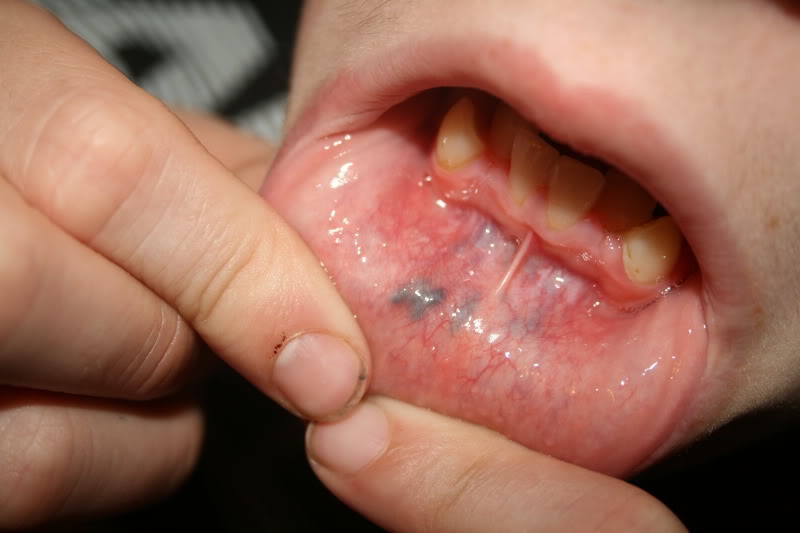A blood lump in mouth wall forms due to damage to the tissues and blood vessels under the skin. These lumps, also known as blood blisters, often have the appearance of pimples and can be very painful. Inside the blister is a mixture of blood and lymph fluid, which is dark in color. This can be a distressing and serious condition, so it is essential to know what’s causing these lumps and what you can do about it.

What Causes Blood Lump in Mouth?
The majority of little blood blisters are formed from everyday wear and tear, minor trauma from hard pieces of food, low-grade burns from hot drinks, or accidently biting part of the lining of the mouth whilst talking or chewing. For example, you may develop a blood blister on back of throat or roof of mouth because of drinking something very hot. Usually, these blisters will heal themselves within a few days, without any medical intervention.
The oral cavity is also susceptible to canker sores (mouth ulcers) and herpes sores. Again, these will clear up on their own, but medication may help to promote healing.
Angina bullosa haemorrhagica is a condition that mostly occurs in the elderly, where a single blood blister appears on the check or tongue, breaks open, then usually heals by itself.
Allergies to prescription drugs and certain foods, especially citrus fruit, can also cause blisters to form.
Nutritional deficiencies, particularly a lack of vitamin C or vitamin B12 in the diet, predispose individuals to blood blisters.
In addition, alcohol abuse is a risk factor.
Finally, low platelet counts, a condition known as idiopathic thrombocytopenic purpura, may cause lumps to form in the mouth.
If you’re worried about a blood lump in mouth wall or a blood blister on back of throat, make an appointment to see an oral specialist for insight into your condition. He or she will look at the color and texture of the lump, and may take a biopsy of your lump and send it to a laboratory for analysis.
How to Deal with Blood Lump in Mouth
However tempting it may be, don’t pop the blister, as this will lengthen the healing time, possibly leading to scarring or further infection. Instead, you should aim to quell the swelling and minimize the discomfort you’re feeling. You can try the following remedies:
When you first notice the blister, apply a cold pad to the affected area. Do this every time you eat or brush your teeth, both before and after.
Take over-the-counter pain medication and anti-inflammatory drugs when you need relief.
Regularly rinse your mouth with antibacterial mouthwash, or water mixed with a teaspoon or two of salt or baking soda.
Be careful when you brush your teeth. You may want to avoid brushing altogether, and spread the toothpaste onto your teeth using your finger, before rinsing it off.
Cut out any salty or spicy foods, such as crackers, salted chips or pickles, as these may irritate the sores, exacerbating the pain and prolonging your symptoms.
Acidic fruit and vegetables, including oranges, lemon, grapefruit and tomatoes, also need to be avoided.
Don’t eat raw vegetables, as these are too hard on your mouth; instead, go for soft and mashed foods that are easier to chew and swallow.
Hot foods can also be uncomfortable on your mouth, so wait until your meals and drinks are at room temperature before consuming them.
Most blisters will heal on their own within about a week, although larger ones may take longer. If you have a persistent sore, or if your symptoms recur, you may need to see a healthcare professional to check if there is any underlying condition.
Can It Be Mouth Cancer?
There is a small chance that the blister is mouth cancer. This tumor can occur anywhere in the oral cavity, although it is most common on the lips, tongue and mouth floor.
The following symptoms in the mouth could indicate cancer:
Persistent blisters or ulcers that bleed.
Visible lumps that may or may not hurt.
Difficulty swallowing, or moving the tongue or jaw.
Loss of sensation or changes in taste.
Swollen gums and/or loose teeth.
Changes in speech.
Swollen lymph glands.
If you notice any of these symptoms, see your doctor as soon as possible, as when tumors are detected at an early stage, the prognosis is good. Your doctor will take a medical history and perform a physical examination. He or she will often perform a biopsy and may also examine you using various scans.
Mouth cancer treatment depends on the tumor type, size and location, and whether it has spread. Small tumors can be removed with surgery or treated with radiation. Chemotherapy, the use of anti-cancer medication, can also be used, often alongside radiotherapy and/or surgery. You may receive various supportive therapies, and after treatment regular check-ups are needed to ensure the cancer hasn’t returned.

View All Comments /Add Comment